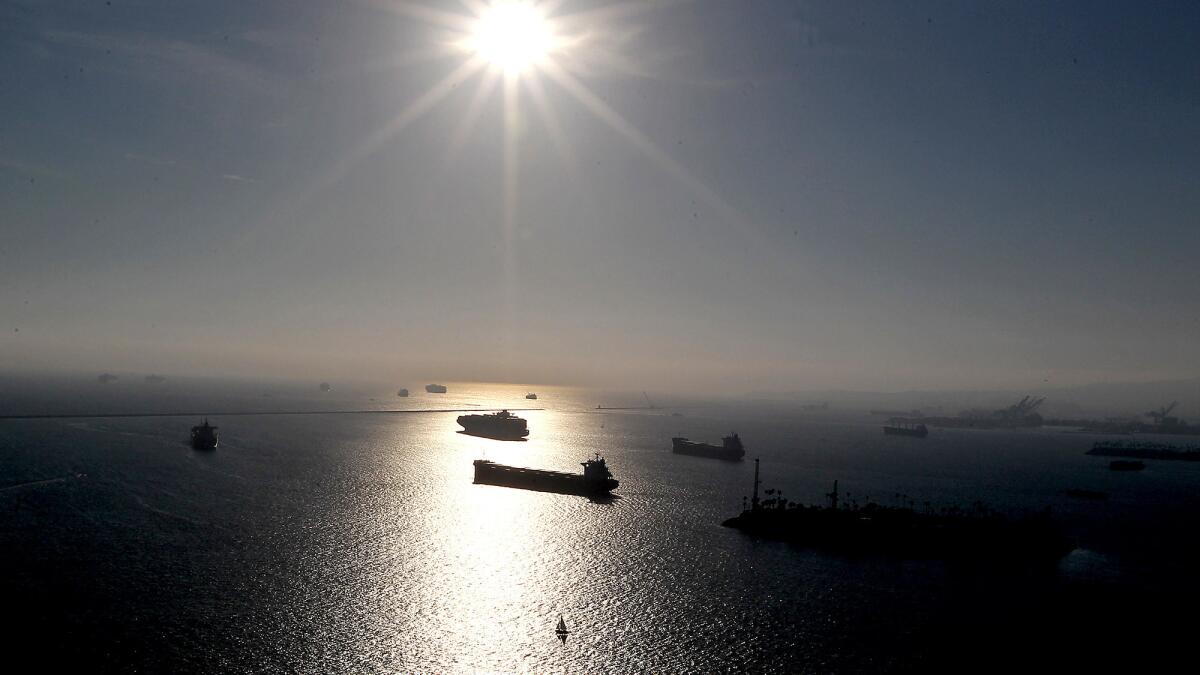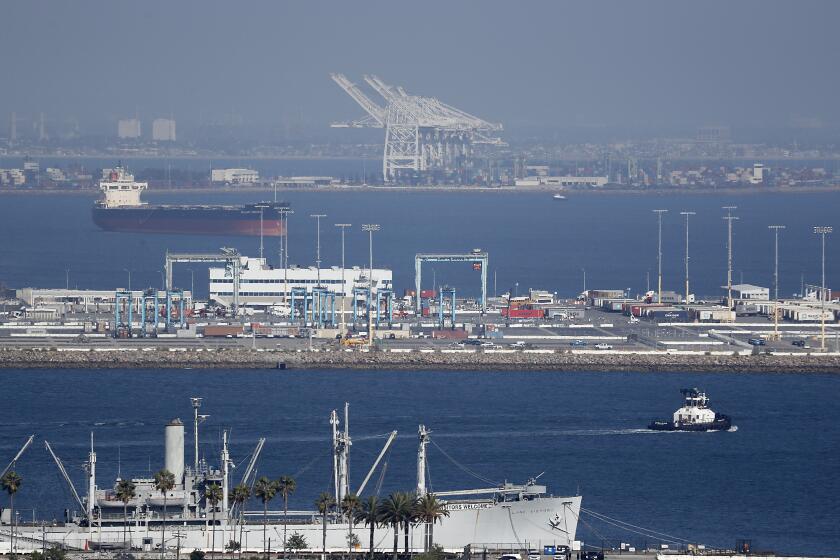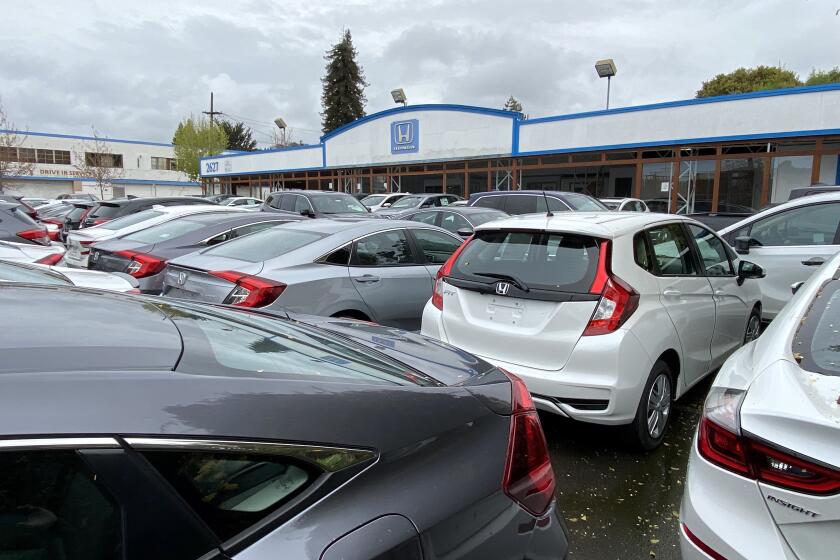SUVs are left parked on ships off L.A. ports as glut of unsold autos grows

- Share via
The length of almost two football fields, the cargo ship Jupiter Spirit arrived in Los Angeles’ harbor on April 24 after an almost three-week journey from Japan, ready to unload its cargo of about 2,000 Nissan Armada SUVs, Rogue crossovers and Infiniti sedans in a quick, half-day operation.
But when the ship, operated by Nissan Motor Co.’s freight arm, got about a mile offshore, its captain was ordered to drop anchor. And there the ship remained for almost a week — a floating symbol of an unprecedented logjam as nearby storage lots covering hundreds of acres overflowed with vehicles that Americans suddenly have little desire to purchase.
There are gluts of all shapes and kinds forming in the U.S., a testament to the scope of the economic pain the coronavirus is inflicting. Slaughterhouses are killing and tossing out thousands of pigs a day, dairy farmers are pouring away milk, oil sellers were paying buyers to take barrels off their hands last week, and now, brand-new cars are being left adrift at sea for days.
For the auto industry, the crisis has left cars gathering dust on dealer lots, dealerships shuttered, auction prices slipping and tens of thousands of workers laid off or furloughed. April U.S. sales plummeted 54% for Toyota Motor Corp., 47% for Subaru Corp. and 39% for Hyundai Motor Co.
The nation’s largest port is hurting. That may be a leading indicator of the pain that’s in store for Southern California and the U.S. economy as businesses hunker down to deal with the rapidly expanding new coronavirus.
“Dealers aren’t really accepting cars and fleet sales are down because rental-car and fleet operators aren’t taking delivery either,” said John Felitto, a senior vice president for the U.S. unit of Norwegian shipping company Wallenius Wilhelmsen. “This is different from anything we’ve seen before. Everyone is full to the brim.”
The Jupiter Spirit’s shipment of vehicles was finally unloaded on April 29. But the auto industry is typically a just-in-time business, which makes the delay at ports like Long Beach so unusual. The majority of the quarter million cars imported from Japan last year came through West Coast ports, mostly via L.A. and Long Beach, according to IHS Markit PIERS data. Some East Coast ports such as in Brunswick, Ga., are experiencing higher-than-normal inventory, but industry officials say the main logjam is on the West Coast.
“It is very abnormal for a container ship, a car carrier or a cruise ship not to go right to the berth, discharge and be on their way,” said Kipling Louttit, executive director of the Marine Exchange of Southern California, a nonprofit that monitors commercial ship traffic.
At the Long Beach terminal south of L.A., cars are discharged at one of two piers — one with a 22-acre lot and another with 168 acres — that are capable of storing several thousand vehicles. They typically spend little time there before being relocated to larger storage lots five to eight miles away, where costs are lower, said Glenn Farren, director of tenant service and operations at the port. Then they’re gradually sent via truck or rail to dealers.
But last month’s sales collapse produced a chain-reaction backlog, causing some ships to divert to other ports, others to wait days to discharge cargo and, ultimately, others to cancel voyages before they even got underway. The Port of Hueneme, a major import facility in Ventura County, had to find space in the surrounding area for about 6,000 surplus cars, in addition to the 4,000 on its site. Auto-logistics firms secured lots at a nearby cold-storage facility and an adjacent U.S. Navy base after scouring sites at local colleges emptied by the coronavirus.
“You can’t stack cars,” said Kristin Decas, the port’s director and chief executive officer. “We even looked at using the Ventura County Fairgrounds.”
The COVID-19 pandemic is unleashing a wave of labor unrest harnessing front-line workers’ fear and anger across California and the nation.
Toyota Motor Corp. has taken the precaution of leasing additional storage space at a sports venue in California, even though it hasn’t yet experienced major issues accepting deliveries from inbound vessels, a spokesman said. A representative for Hyundai Motor Co. said the South Korean automaker also has experienced elevated West Coast inventories and found additional storage lots to ease pressure on port facilities.
Jupiter Spirit is operated by Nissan Motor Car Carrier Co., an affiliate of the Japanese carmaker and Mitsui O.S.K. Lines Ltd. Nissan said the delays at Long Beach are a result of decreased demand amid the COVID-19 pandemic and that it does not currently have a timetable for clearing its vehicles from the port and secondary-storage lots.
“The company is optimizing the flow of the vehicles and positioning them closer to dealers for quick availability when the market recovers and customers return to showrooms,” said Nissan spokesman Chris Keeffe.
Another car-carrying vessel, operated under lease by Japan’s Kawasaki Kisen Kaisha Ltd., arrived in L.A. on April 21 and discharged its cargo. But the ship, the Morning Crystal, hung around for a week awaiting its next mission to Nagoya, Japan, which is atypical in an business where busy ships normally run routes back-to-back.
Even as ports struggle to cope with excess auto inventory, they’re preparing for an even worse outcome — deliveries stopping altogether as the recession digs deeper.
Showrooms are closed, but many car dealers sell online, with delivery to your door.
Demand for cars and trucks in the U.S. is expected to drop 27% to 12.5 million vehicles this year, IHS Markit estimates, which would be the fewest for the industry since 2010. Used-car prices are expected to plunge somewhere in the range of 8% to 16% through June, according to J.D. Power, then stabilize by year-end as the country reopens and demand picks back up.
Those sour predictions match up with what the Hueneme Port expects: at least a 25% drop in auto shipments in the coming year. Auto-import logistics companies already have laid off about 80% of local staff in anticipation of a long dry spell, Decas said. Her port has only two car-carrying ships scheduled after May 17 compared with at least four or five a week in normal times, she said.
The port is fortunate in having another source of revenue, though. It’s a big importer of tropical fruit, like pineapples, avocados and especially bananas.
“People may not buy cars in a recession,” Decas said, “but they’ll eat a banana.”
More to Read
Inside the business of entertainment
The Wide Shot brings you news, analysis and insights on everything from streaming wars to production — and what it all means for the future.
You may occasionally receive promotional content from the Los Angeles Times.












